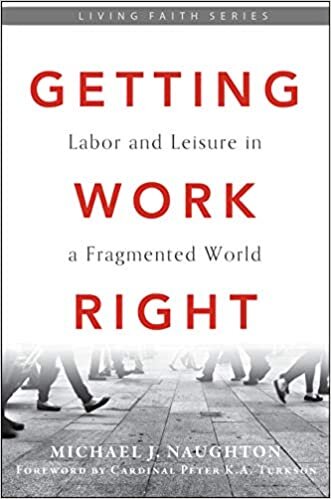Getting Work Right: Labor and Leisure in a Fragmented World
Michael J. Naughton
Emmaus Road Publishing (2019). 171 pp.
Book Review
Michael Naughton, director of the Center for Catholic Studies at the University of St. Thomas, has given a thought-provoking gift to the church today. In a society driven by productivity and profits, he’s presented a powerful defense of what would have been known by all Christians just a generation or two ago: that we are finite creatures who have been given a divine calling (or vocation).
Naughton’s main thesis could be boiled down to this: if we get work wrong, we cannot get rest right; and if we get rest wrong, we cannot get work right. He begins by discussing our condition as fallen individuals who often fall into one of two ditches: viewing work as a career (and thus leisure in terms of its utility), or viewing work as a mere job (and thus leisure as mere amusement). Both fall short of the Bible’s understanding of work as a divine calling.
Instead, Naughton explains how the “logic of gift” helps the Christian find his bearings by reminding him of his creaturely-ness. We’ve all been given a vocation, which contains both personal and communal (especially ecclesial) dimensions. Apart from these dimensions and from consciously re-framing our job in terms of a divine calling, work will become either a slave-driving idol or a meaningless series of unfulfilling tasks.
From there Naughton begins to positively construct a theology of vocation, specifically looking at business and labor. He argues in Part 2 that business is a secondary institution (behind the family and the church), meaning that it is significant in supporting the primary institutions and the common good. In chapter 5 he introduces the concept of subsidiarity, an idea that he never precisely defines, but generally explains as recognizing that each worker has something to give others (79). This principle rightly applied, he argues, enables for business institutions and individual workers to both do good work.
Lest the goodness of work be limited merely to the process and not to the product, chapter 6 explains the somewhat thorny issue of, “what makes a good good?” He teaches through some light Thomistic ethics, including discussing formal and material cooperation between workers and institutions, in a helpful way without being either too abstract or too situation-specific. He concludes this part with a final chapter discussing wealth. Money is not an evil, nor is profit. Indeed, both are necessary for this world and for good business to function. However, neither money nor profits can take over as the primary goal for either the business or the individual worker. Wealth is good when it is created through hard work and shared appropriately.
Finally, Naughton concludes with a single chapter on rest, leisure, and sabbath. He balances all the previous language of work, calling, industry, and business with the reminder that we were all created for more than work, a concept which sabbath observance emphasizes weekly. Sabbath keeps us free from the tyranny of work: indeed, its power lies in its potential for keeping us free, Naughton argues (147). If we get Sunday wrong, we’ll get the rest of the week wrong, because we were meant to be recipients of divine grace and communion, neither of which can be secured through work.
Having written my dissertation on sabbath, I eagerly jumped at the chance to review this book. Naughton is easy to read, but heavy-laden with wisdom; you can tell that this is the product of years of thinking and teaching on the subject. Some sections I had to stop and meditate upon prior to proceeding to the next chapter; many times I found myself personally challenged about how I was operating and viewing the world. While his Roman Catholic background was evident a few times throughout the book (e.g., his discussion of holy orders as divine vocation (40) or his talk of confession prior to Lord’s Day observance (161)), most of the book would be equally welcome in a Protestant setting. He weaves together practical examples from the business world, personal anecdotes of lessons he’s learned over the years, and helpful quotes from authors who have written on this topic (e.g., Thomas Aquinas, Josef Peiper, John Paul II, and even the Jewish philosopher Abraham Heschel).
While not as exegetically argued as I had hoped, if you’re looking for a readable, yet personally stimulating introduction into a theology of work and rest (including vocation, ethics, and sabbath), then Naughton’s book is a wonderful choice.
Jon English Lee is Pastor of Discipleship at Morningview Baptist Church in Montgomery, AL. He has earned a Bachelor’s degree from Auburn University in Montgomery, a Masters of Divinity from Southern Seminary, and a PhD in Systematic and Historical Theology at Southern Seminary. Prior to serving at Morningview, he served various churches and para-church organizations in Alabama and Kentucky. He is a member of the St. Augustine Fellowship of the CPT.




